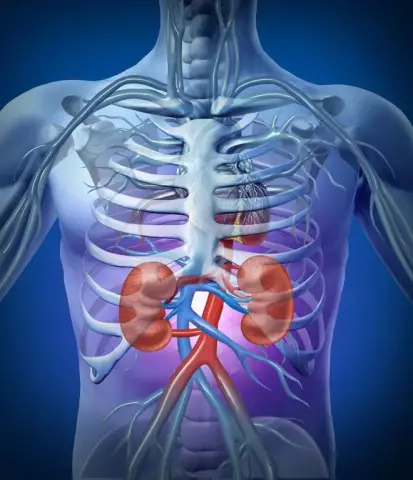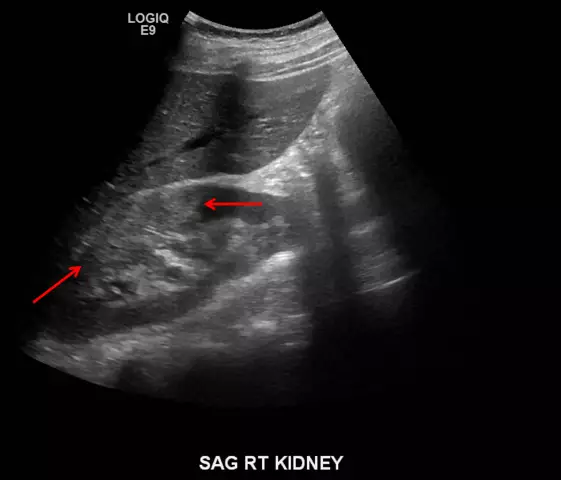- Author Rachel Wainwright wainwright@abchealthonline.com.
- Public 2023-12-15 07:39.
- Last modified 2025-11-02 20:14.
Acute pyelonephritis
Brief description of the disease

Acute pyelonephritis is an infectious and inflammatory disease characterized by an acute course and damage to the renal tissue, as well as the renal pyelocaliceal system. The disease occurs both by itself and is a consequence of an existing kidney disease.
Symptoms of acute pyelonephritis
- headache;
- chills, profuse sweating;
- high body temperature;
- severe pain in the lumbar region and joints;
- discomfort in the region of the kidneys and hypochondrium.
Acute pyelonephritis - treatment of the disease
As a rule, patients need hospitalization. The main principles of treatment are bed rest, drinking plenty of fluids, medication, and a special diet. Pyelonephritis (the diet is prescribed on the first day of treatment) is associated with intoxication, so patients are advised to consume large amounts of fluids, fresh vegetables, fruits and berries. In the future, dairy and vegetable dishes are included in the standard diet. The energy value of the diet should not exceed 3200 kcal per day.
After analyzing blood and urine samples, the doctor makes a decision on the use of one or another group of antibiotics. Acute pyelonephritis, the treatment of which is difficult due to the possible appearance of serious complications, requires an integrated approach, therefore antibiotics of various groups are used (fluoroquinolone agents are most effective) in combination with nitroxolinic acid and nitrofuran drugs. Antibiotic therapy lasts up to 6 weeks so that acute pyelonephritis does not become chronic. This period must be maintained even against the background of the fact that the patient's complete recovery usually occurs by 4 weeks.
If a person develops secondary acute pyelonephritis, treatment is aimed at eliminating the underlying disease. It should be borne in mind that the secondary form often proceeds against the background of purulent processes, kidney stones and violations of the normal outflow of urine, which often requires surgical intervention.
There are also complications such as:
- apostematous nephritis - the appearance in the capsule of the kidney of a large number of small abscesses;
- abscess - purulent fusion of renal tissue;
- carbuncle of the kidney - the formation in the tissues of the kidney of a purulent-necrotic focus.
Acute pyelonephritis in children

At an early age, the disease proceeds with some peculiarities due to the morphological immaturity of the genitourinary system in the child and a tendency to a severe course of the inflammatory process.
The initial stages of the disease are violent. Children develop: hyperthermia, toxicosis, exsicosis, agitation, weight loss, regurgitation, loose stools and anxiety before or after urination. The disease spreads rapidly and affects not only the kidneys, but also the liver, adrenal glands, central nervous system, causing numerous complications, in particular, sepsis, nephritis, kidney carbuncle, renal papilla necrosis.
All existing methods of treatment involve combating the infectious process and intoxication, as well as increasing the reactivity of the body and restoring normal urodynamics. If a child is diagnosed with acute pyelonephritis, the pediatric nutritionist prescribes a diet from the first day of treatment. It is necessary to limit or completely eliminate peppers, onions, smoked meats, coffee and other irritating products from the diet. Fruits, vegetables, berries (including watermelons), a large amount of liquid will be useful. Transfusion, rehydration and detoxification therapy is recommended for young children. The same measures are prescribed in the event that acute pyelonephritis in children proceeds with severe complications or the disease threatens to progress to a chronic form.
Acute pyelonephritis during pregnancy
In terms of the frequency of occurrence of acute pyelonephritis in pregnant women, it is ahead of all other diseases of the urinary system. This fact is explained by the characteristics of the body of a pregnant woman and the influence that the fetus has on the activity of the urinary tract.
According to modern estimates, the acute form of the disease is observed in 6-10% of pregnant women. If, under normal conditions, a woman's body more or less successfully resists infections, then during pregnancy, the defense mechanisms weaken. So, for example, the muscles of the mother's internal organs relax, the tone of the bladder, ureters and urethra decreases, which allows the infection to quickly and easily penetrate the body.
Treatment of acute pyelonephritis during pregnancy involves the appointment of antibiotics. In this case, it is necessary to take into account the fact that most of the existing drugs are dangerous to the fetus. In the first trimester, it is recommended to use semi-synthetic penicillins (amoxicillin, ampicillin). In the second and third trimester, macrolides (azithromycin and erythromycin) can be added to them. In no case should you use aminoglycosides, tetracyclines and cephalosporins, since drugs of these groups cause fetal toxicosis.
The course of treatment for acute pyelonephritis during pregnancy is 7-10 days. In the absence of positive dynamics, doctors consider the need to install a catheter or stent until the end of pregnancy, which will allow urine to drain and eliminate the possibility of complications.
YouTube video related to the article:
The information is generalized and provided for informational purposes only. At the first sign of illness, see your doctor. Self-medication is hazardous to health!






